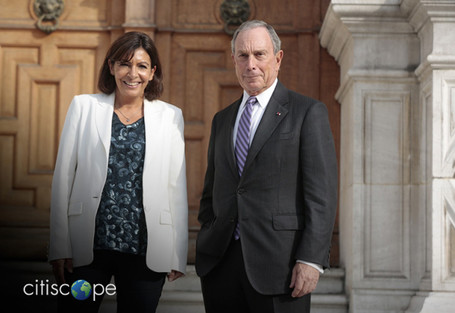
The Climate Summit for Local Leaders will take place 4 December.
With less than six months to go before a potentially historic United Nations conference on climate change takes place in Paris, major world figures are making their positions known on a variety of issues. Increasingly, one key subject is revolving around the role of cities.
Last month, Pope Francis took a prominent step to highlight the disproportionate impact of climate change on the urban poor and called on planners and city leaders to improve neighbourhoods and public spaces. This week, Michael Bloomberg, the former mayor of New York City, and Anne Hidalgo, the current mayor of Paris, publicly called for increased recognition of the role of cities and local governments at the Paris climate talks, which start in November.
Bloomberg has made climate change a signature policy focus of his post-mayoralty. He is now the U. N. secretary-general’s special envoy for cities and climate change, but while in office he was known for championing the greening of New York City. That stance resulted in a 19 percent decrease in the city’s carbon emissions over six years.
Hidalgo, meanwhile, has pledged to cut Parisian emissions by 40 percent before 2030. When national delegates gather later this year at Le Bourget, an airport-turned-conference-site outside Paris, she will co-host, along with Bloomberg, a summit for mayors called the Climate Summit for Local Leaders. The event, now scheduled for 4 December, will take place at the Hôtel de Ville, the Parisian city hall.
The mayors’ announcement came the day before subnational entities, local governments and nonstate actors – in short, everyone who isn’t a national government – are meeting for a two-day summit. That event, the World Summit on Climate and Territories, takes place 1-2 July, in Lyon, France for the most significant such event ahead of the Paris talks.
In Lyon, local leaders are expected to arrive with specific emissions-reduction pledges and, over the two days, hash out their commitments. Ultimately they will prepare formal proposals to the states that will actually sit at the negotiating table later this year in Paris.
The stakes are high for local governments, Bloomberg and Hidalgo said, because cities and regions are on the front line of climate change. Local and regional authorities are the first responders to natural disasters and must adapt accordingly.
In order to achieve that goal, however, more fiscal autonomy and local decision-making powers are needed. For example, improved municipal credit ratings would allow city governments to access global capital markets to finance infrastructure improvements, such as mass transit, that could reduce an urban area’s carbon footprint. And authority over regulations such as energy standards for buildings likewise would allow cities to proactively curb emissions.
These New York and Paris luminaries are not acting alone. Last year, the C40 Compact of Mayors was launched to generate buy-in from civic leaders globally. (The C40 Cities Climate Leadership Group is a global cities network for tackling climate change; its board is chaired by Bloomberg.) Further, U. N. Secretary-General Ban Ki-moon is also on board, alongside the other major international city networks, UCLG and ICLEI.
Collectively, the local government lobby is amassing a notable bully pulpit for use at the Paris negotiations.
See more of Citiscope’s reporting on this issue here.










